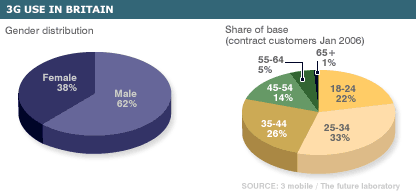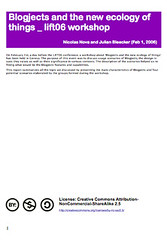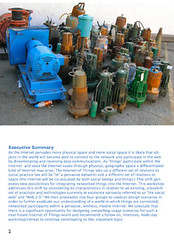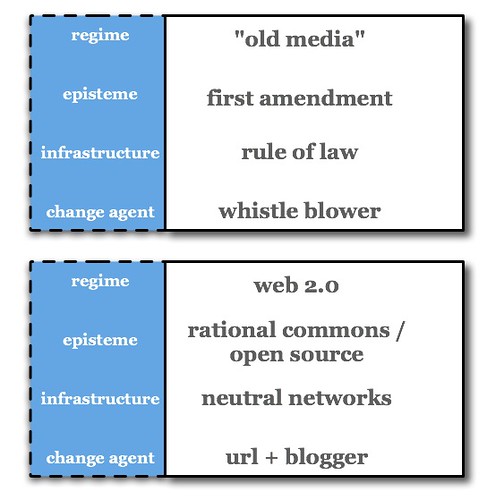From September 2005 to June 2006 a team of thirteen scholars at the The University of Southern California's Annenberg Center for Communication explored how new and maturing networking technologies are transforming the way in which we interact with content, media sources, other individuals and groups, and the world that surrounds us.
This site documents the process and the results.
categories
Notes on Saskia Sassen. 3G mobiles 'change social habits' + Creative Destruction

This article was lurking in a Smart Filter in NetNewsWire.
3G mobiles 'change social habits':
Widespread use of 3G mobile phones may change the way people interact and increase creativity, a study suggests.
Okay —Â only one point I want to touch on here and that's the money angle of the study. Usage was heavy because 3G services were offered for free to the study participants. That's fine.
Here's my semi-related non sequitur — two days ago, while in San Jose at GDC, I had to call someone from Nokia, who had an overseas number. They were in the US, probably within 50 meters of me, but my Sprint phone wouldn't call them without turning on international dialing. Fine. 20 minutes on hold, I finally got to the guy who was going to click a box in some back-office CSR application. Click it once. He didn't need to click it once a month. But, regardless, it was going to cost me $5 a month to have the privilege of dialing a number. A recurring charge, no matter whether I made calls or not. That on top of whatever premium Sprint extracted from me for the call. (I can't even call it "overseas" —Â the guy was nearby. And even if he was in a place that required crossing large bodies of water —Â what difference does that make today? I mean..really?) I thanked the guy and hung up, screwed my face in muddled disgust, and set out to find a friend who'd loan me their mobile. But then it hit me — Skype! I got on the WiFi there at the convention hall, plugged in my earphones and made the call.
It cost me about 17 cents.
Why do I blog this? Two things.
1. How much do economics inform change in social practice?.
2. Creative destruction —Â an expression Saskia Sassen deployed during this afternoon's talk, may be in effect here, in hindsight. As a model for evolutions of changed in material instrumentalities — technical instrumentalities —Â Skype may be in the process of compelling conventional mobile media communications networks to revamp their business practices. Is that what creative destruction means? It also makes me think of the way protocols/architectures/softwares such as BitTorrent are engaged in a form of "creative destruction", possibly. BitTorrent makes worldly change —Â BitTorrent is a change agent. The software, the protocol, what it is able to effect and how it eludes the grasp of existing ways of doing things —Â of doing business, of distributing content, all that.
Technorati Tags: theory object
Saskia Sassen Lecture : Networks, Power & Democracy March 23, 2006
Saskia Sassen spoke on Networks, Power & Democracy at the Networked Publics research group at the Annenberg Center for Communications on March 23, 2006.
Professor Saskia Sassen is in the Department of Sociology and The Committee on Global Thought at Columbia University. She is also a Centennial Visiting Professor at the London School of Economics.
Saskia Sassen’s research and writing focuses on globalization (including social, economic and political dimensions), immigration, global cities (including cities and terrorism), the new networked technologies, and changes within the liberal state that result from current transnational conditions. In her research she has focused on the unexpected and the counterintuitive as a way to cut through established “truths.” Her three major books have each sought to demolish a key established “truth.” Thus in her first book, The Mobility of Labor and Capital (Cambridge University Press 1988), she showed how foreign investment in less developed countries can actually raise the likelihood of emigration; this went against established notions that such investment would retain potential emigrants.
In her second book The Global City (Princeton University Press 1991; 2nd ed 2002) she showed how the global economy far from being placeless, has and needs very specific territorial insertions, and that this need is sharpest in the case of highly globalized and electronic sectors such as finance; this went against established notions at the time that the global economy transcended territory and its associated regulatory umbrellas. In her most recent book, Territory, Authority, Rights: From Medieval to Global Assemblages ( Princeton University Press 2006), she shows that the foundational transformations afoot today take place largely inside core and thick national environments; this allows her to explain that some of the changes inside liberal states, most evident in the USA but also increasingly in other countries, are not distortions or anomalies, but are the result of these foundational transformations inside the state apparatus. She shows how this foundational transformation hence consists not only of globalizing dynamics but also of denationalizing dynamics: we are seeing the formation of multiple often highly specialized assemblages of bits of territory, authority and rights that were once ensconced in national framings. Today these assemblages traverse global and national settings, thereby denationalizing what was historically constructed as national.
Report from the Blogject Workshop at LIFT06
Nicolas and I have finished our Next Iteration on the Blogject project — our workshop report from Lift06..Read, Ponder, Complain and Disseminate.


On February 1st, a day before the LIFT06 conference, a workshop about ‘Blogjects and the new ecology of things’ was held in Geneva. The purpose of this event was to discuss usage scenarios of Blogjects, the design issues they raises as well as their significance in various contexts. The description of the scenarios helped us refining what would be the Blogjects features and capabilities.
This report (.pdf, 18.6Mb) summarizes all the topic we discussed by presenting the main characteristics of Blogjects and four potential scenarios elaborated by the groups formed during the workshop.
As the Internet pervades more physical space and more social space it is likely that objects in the world will become able to connect to the network and participate in the web by disseminating and receiving data communications. As “things” participate within the Internet and once the Internet soaks through physical, geographic space a differentiated kind of Internet may arise. The Internet of Things sets up a different set of relations to social practice (we will be “in” a pervasive network) and a different set of relations to space (the Internet will be co-occupied by both social beings and things.) This shift generates new possibilities for integrating networked things into the Internet. This workshop addresses this shift by considering its characteristics in relation to an existing, prevalent set of practices and technologies currently in existence variously referred to as “the social web” and “Web 2.0.” We then proceeded into four groups to conduct design scenarios in order to further explicate our understanding of a world in which things are connected, networked participants within a pervasive, wireless, mobile Internet. We conclude that there is a significant opportunity for designing compelling usage scenarios for such a near-future Internet of Things world and recommend a follow on, intensive, multi-day workshop/retreat to continue contributing to this important topic.
Feel free to spread it, make any comment, reblog it!
Technorati Tags: blogjects, lift06
The divide that separates people from their online lives
The divide that separates people from their online lives:
This BBC article quotes Dr Jo Twist,a senior research fellow at the Institute for Public Policy Research in the UK,as saying "once the net was ubiquitous like power and water,it had the potential to be "transformative".The divide that separates people from their online lives will utterly disappear. Instead of leaving behind all those net-based friends and activities when you walk out of your front door,you will be able to take them with you.The buddies you have on instant message networks,friends and family on e-mail, your eBay auctions, your avatars in online games, the TV shows you have stored on disk, your digital pictures, your blog - everything will be just a click away.It could also kick off entirely new ways of living, working and playing.For instance, restaurant reviews could be geographically tagged so as soon as you approach a cafe or coffee shop, the views of recent diners could scroll up on your handheld gadget.Alternative reality games could also become popular.These use actors in real world locations to play out the ultimate interactive experience.Key to the transformation,said Dr Twist,would be mobile devices that can use wi-fi.These handsets are only just starting to appear but will likely cram a huge amount of functions into one gadget.Dr Twist believes the move could start to close the digital divide".Further,"when chips,sensors,and wireless devices mesh together, there may be some unintended consequences," said Dr Twist."We have to make sure we think about those, and think about what other exclusions might be brought about by those developments, too."
Wi-fi set to re-wire social rules
Why do I blog this? I don't agree to the knee-jerk assertions about everything changing (the authors use the politic "transformative" instead of the usual exuberant adjectives), and this business about restaurant reviews pushed to devices is positively irritating to think about which probably means it could start a consumerist insurgency were it to actually happen. But, I have been working on a paper — recently accepted to the WWW2006 - MobEA IV workshop that says "we are in the midst of a mobile revolution" so maybe I have something to contribute to the transformation/revolution that will mitigate such an insurgency.
Cubicle Culture
Fortune Magazine carries an article Robert Propst and the history of the cubicle. As moves away from physical offices toward more fluid, cybernetically conceived spaces, cubicles were an evolutionary step toward the networked workplace of our own day. Along with the fascinating history of this ubiquitous part of office design, the article makes some surprising observations about the present, most notably that 26 million Americans now telecommute via broadband. The article is, unfortunately, vague about whether this mean they just check their email once a day from home or whether they don't bother going into the office at all.
Technorati Tags: cubicle culture, cybernetics, networked publics
Just How Much Has the Internet Really Changed?
A note of caution about the networked publics revolution is sounded by Directgov, the UK's new one-stop government portal in a survey released on March 6. According to the survey, which of course would seem to validate the site's strategy of consolidating “public services all in one place,
the car is the new office
Today's New York Times reports on studies showing that the use of cell phones in automobiles is increasing at the expense of radio broadcasts. As reported by the Times, the study did not account for iPod usage, which makes the validity of the results a little questionable since in my personal experience, at least, the iPod receives about equal time with my cell phone with radio a distant third. Nevertheless, it suggests that busy commuters are continuing to extend their workplace from office and home-office into their transit time. Or maybe they're just trying to figure out what groceries to bring home. Intriguingly, the survey notes that cell phone conversations in the car are longer than outside of the car. Will "call you from my car" soon denote the most highly prized of conversations? Will it become important to live far from one's workplace in order to have longer, more sustained conversations without the disruptions of email, IM, co-workers, or family members?
Technorati Tags: network city, telecommunications
Americans Finally Getting the Message
The most recent issue of the Economist carries the surprising news that America has finally caught up to the rest of the world in text messaging, surpassing Germany, Italy, and France. What took us so long? Cheap calling plans meant that there was little reason for texting while incompatible devices and the extra cost carriers frequently charged for texting didn't help. Meanwhile the burgeoning adoption of mobile phones by young people and, surprisingly enough, the reality show “American Idol,
A Manifesto for Networked Objects — Cohabiting with Pigeons, Arphids and Aibos in the Internet of Things
One of my pieces of "output" from the workshop on Blogjects/Networked Things that Nicolas and I put together is the document contained herein. (BTW, we're very close to having our more formal workshop "write-up" completed.) It started out as some scribblings on what I learned from the workshop, seeing the groups' projects, and so forth. It then grew into more of a polemic as I recognized what were some consequential stakes — why things would matter, or help, if Things were networked? Why would I want a world such as that? And how would I design interactions for such a world?
I didn't want to lay low and play the engineer who might just geek out on the technology behind networked Things (I do.) I didn't want to lay low and play the social scientists and just geek out on theorizing or studying how engineers make and how social beings interact in a world of networked Things (I do that, too). I wanted to start by creating a near-future kind of technology fiction about one particular set of design goals for a world in which networks pervades space and social practice and in which networks are co-occupied by slightly differentiated social beings — us and Things.
What would I want from such a pervasively networked world? A better bead on what the state of that world is that is impactful. Hence, my stumbling about trying to describe a world of networked Things that aren't only around to help track packages, but are around to help create a world-wide accessible register various real-time "feeds" of macro and micro states of the social and ecological environment.
This is not complete and the translation of my ideas to a progression of articulate words sometimes feels like someone who slips on the ice for about 20 minutes and refuses to give up the struggle and just fall down to save themselves the mounting embarassment.
Technorati Tags: blogjects, RFID, The Internet of Things
Super Heros become Super Common - One remark from conversations with Yochai Benkler
I found myself in the advantageous position of having both Yochai Benkler and Mimi Ito at the same supper table. I puzzled over what was the one question I would want them both to answer — something that went beyond framing particular practices of cultural production and its meaning. So, I asked them both — what is your future imaginary world? Based on what you know, your stakes, your opinions — your research — what would you aspire to create as a more habitable, sustainable world?
Benkler gave a number of examples during his talk about how the network and some common super heros effected worldly change. While he was giving these examples, I quickly thought about a decision I had made in the morning about what shirt to wear. One option was my Daniel Ellsberg t-shirt. The other was a short sleeve buttoned number. I opted for the buttoned shirt, but the Ellsberg option lingered. I thought about what it took to be an agent of change during the regime of "old media." The agent of change, or one of them, was superhuman in their will, commitment and daring-do — it was the Whistle Blower. (As a matter of fact, that Daniel Ellsberg t-shirt was from a series of t-shirts that the artist / designer Raegan Kelly had done exclusively dedicated to Whistle Blowers.) What an effort and what stakes to be a super hero / change agent of that scale. How many of us could conceive of striving against "the Pentagon" (and everything else that systemically supports that institution) so as to publish some documents spirited out of the RAND Institute.
Today, Ellsberg would just blog the Pentagon Papers. Open source, neutral networks would allow that. Even if the Cease & Desist letters came in, once it got out — one would be hard pressed to even find a way to expunge the documents from today's P2P networks.
The examples that Benkler gave of common super heros effecting worldly change came across as almost routine examples. Someone in a condo complex somewhere stumbles across some emails from some guy at some corrupt government contractor trying to screw over the American public. We chuckled at the fumblings of institutions that sought to suppress Diebold's voting machine software and other similar "old regime" attempts at squelching the will of common, everyday super heros. It's all routine, it's just how things happen. The Ellsberg's of tomorrow — the digital kids? — they'll just register a domain name and set up a blog. They won't even have to muster the ACLU lawyers out of bed.
My own stakes and aspirations are that all of this networked publics "stuff" (to quote Mimi!), will hopefully lead to a world in which individuals (digital kids) grow up with the sense that they are full enrolled, first-class participants in the polity and that they have a to-the-bones, intuitive sense that they can effect worldly change with some ideas, an articulate voice, and an $8.95 domain name.
This is far more than simple civics 101 from the 1980s. This would be the sense that "I can make things happen and change the way things are. I can be a common super hero and, in fact, there are an enormous number of super heros in the world who right wrong and suppress evil, greed and wrong-doing.
Why do I blog this? It's the stakes: creating a world in which we (or the digital kids) have a sense of participation and a conviction that change is possible, and that individuals with ideas and aspirations for creating more habitable and sustainable worlds, can be common super heros — agents of change, without the kinds of burdens we normally associate with being a super hero..like lawyers fees and the threat of having your family's life destroyed.
Technorati Tags: web2.0 world2.0
.
.

